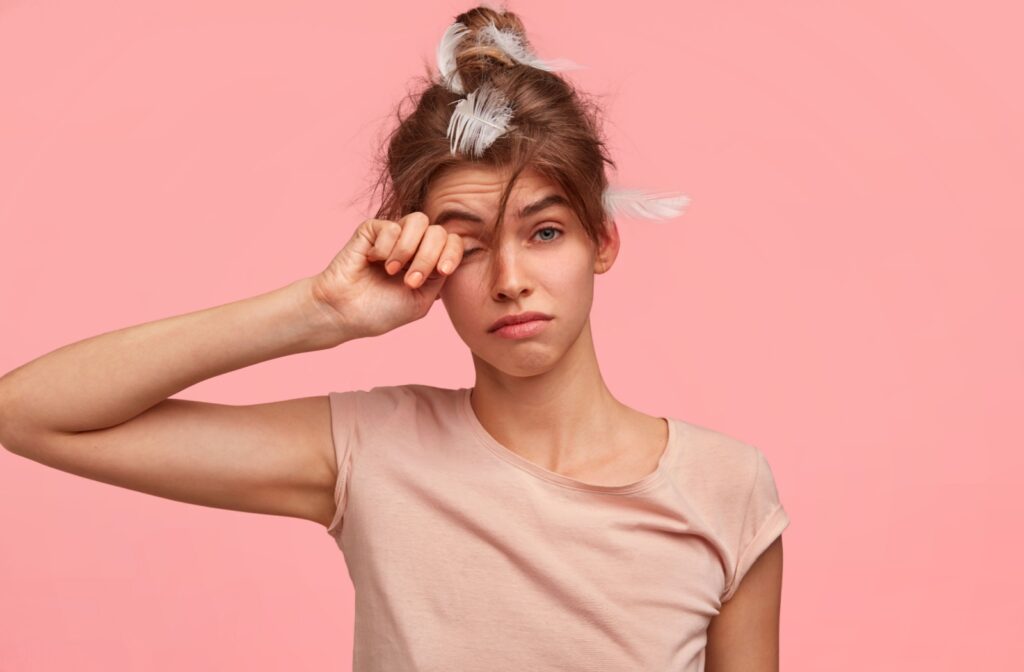Waking up uncomfortable because of dry eyes is not how anyone wants to start their morning.
Truthfully, you can experience dry eyes at any point, especially at night when tear production naturally slows down, and poor or interrupted sleep can affect overall eye health.
On top of that, certain factors can contribute to morning dry eye symptoms, such as:
- Incomplete lid closure
- Dry sleep environment
- Sleeping in your contact lenses
- Using screens before bed
- Not removing eye makeup
- Not drinking enough water
With dry eye therapies and simple sleep habits, you can prevent morning dry eye from ruining your day. A dry eye consultation with Dr. Rehana Manji & Associates is the first step to long-term relief.
Defining Dry Eye
Your tears do a lot more than help you express emotions. They play a functional role in supporting your overall vision and eye health by protecting your eyes from debris and irritants and keeping them hydrated.
Your tear film consists of three layers. Instability in any of these layers can cause your tears to evaporate too quickly from the eye’s surface or create poor-quality tears, leading to dry eyes.
Morning dryness can be particularly noticeable because certain factors relating to your sleep can influence the condition of your tear film.
How Sleep Can Aggravate Dry Eyes
When you sleep, your body naturally reduces tear production. We don’t blink when our eyes are closed and at rest, which is perfectly normal. However, if your eyes are already experiencing dryness, this can create a moisture deficit.
Studies also suggest a connection between quality sleep and eye health. Sleep deprivation and poor or interrupted sleep can slow down the natural regeneration process of your eyes, worsening dryness.
Moreover, other factors can also cause dry eyes to worsen, contributing to morning dryness.
Incomplete Lid Closure
Some people experience nocturnal lagophthalmos, a condition where their eyelids don’t fully close during sleep. This exposes the tear film to air, causing it to evaporate and leading to significant dryness and irritation by morning.
If your eyes don’t close completely during sleep, a sleep mask can help protect your eyes by limiting air exposure.
Start by applying an artificial tear eye ointment to your lash line before bed and covering your eyes with a sleep mask. This helps retain moisture and prevent dryness throughout the night, making it handy for those with incomplete lid closure.
Dry Sleep Environment
Dry and windy climates can encourage greater tear evaporation.
Sleeping with the air conditioner, heating system, or with the fan on creates a dry environment. Without adequate moisture in the air, your eyes may struggle to retain hydration overnight.
Use a humidifier to help maintain moisture in the air and keep your air conditioning, heating system, or fan speed on low to prevent tear evaporation.
Sleeping in Your Contact Lenses
Never sleep in your contact lenses—unless your optometrist okay’s it otherwise.
Wearing them overnight can significantly limit oxygen supply to your eyes and disrupt their natural tear maintenance. This increases the likelihood of waking up with dry, irritated eyes or even an eye infection.
Follow proper contact lens wear and care, and always remove your contacts before bed.

Using Screens Before Bed
Spending hours scrolling on your phone or watching TV before bed can reduce your blink rate and cause eye strain. This means your eyes have less time to replenish the tear film, leaving them drier by morning.
Limiting your screen time at least an hour before bed allows your eyes to rest and encourages natural blinking. Try reading a book instead to promote better sleep!
Not Removing Eye Makeup
Skipping your skincare routine after a long day is one thing, but not removing your eye makeup (or contact lenses) is another.
Leaving makeup on overnight, such as mascara or eyeliner, can block your eyelid’s oil glands. This makes it harder for your eyes to maintain a stable tear film and can contribute to irritation and dryness. Besides, it can trigger a blepharitis flare-up if you’re prone to outbreaks.
Gently remove eye makeup and clean your eyelid margins to prevent debris from clogging your eyelid glands.
Not Drinking Enough Water
Without adequate hydration, your tear production decreases, leading to dryness when you wake up. Stay hydrated throughout the day and keep a water bottle at your nightstand for easy access at night.
Fighting Dryness with Dry Eye Therapy
Given the chronic nature of dry eyes, there is no permanent cure, but we can manage it appropriately.
When you visit our expert team for a dry eye therapy consultation, we can develop a therapy plan to promote a more stable and healthy tear film. Some of the therapies we offer include:
Meibomian Gland Expression
Meibomian gland expression is an in-clinic treatment in which we gently unclog the glands, often using heat therapy to melt and express the oil buildup. This process improves the stability of your tear film and reduces dryness.
ZEST Treatment
Zocular Eyelid System Treatment (ZEST) is an in-clinic treatment in which we deeply cleanse and exfoliate your eyelids. This helps target debris and bacteria that contribute to dry eyes. ZEST also supports a healthier tear film by improving the health of your eyelid margins.
Medicated Eye Drops
Some prescriptions work by reducing inflammation in the tear glands or on the eye’s surface, which can help restore natural tear production.
Others may contain ingredients that help stimulate tear production or protect the eye’s surface from further irritation.
Experience Comfortable Sleep
At Dr. Rehana Manji & Associates, we’re committed to compassionate and personalized care. We specialize in managing the whole picture, not just surface-level concerns, so our patients can experience noticeable relief. Our goal is to improve your eye health and help you experience a fresher start to your morning. Connect with our team to book your dry eye consultation today!


